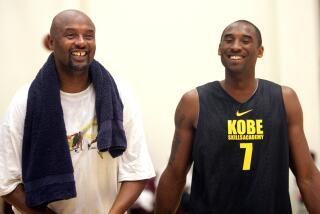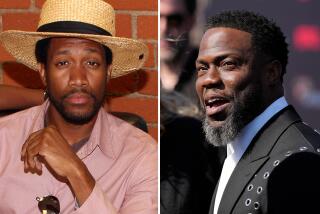Bryant and His Accuser Settle Civil Assault Case
Kobe Bryant and the woman who accused him of sexual assault settled her civil lawsuit out of court Wednesday, marking the end of an often-graphic 20-month legal saga that drew worldwide attention but never resulted in a trial.
Bryant and the 20-year-old woman said in a statement that the civil suit “has been resolved to the satisfaction of both parties” and filed a motion in Denver asking U.S. District Judge Richard Matsch to dismiss the case.
Although there was no mention of a financial payout in the court filing or the statement, the Laker guard is widely believed to have agreed to write a check to the woman to bring about a quiet conclusion to the case.
“The parties and their attorneys have agreed that no further comments about the matter can or will be made,” the lawyers’ statement said.
Civil juries in Colorado can award damages of no more than $366,000 for pain and suffering, and the total amount a plaintiff can win is about $2.5 million.
Experts said that the settlement probably exceeded that amount because it included a confidentiality agreement, but that the damage to Bryant’s reputation from the criminal charge might have weakened the accuser’s leverage.
Also, said Denver legal analyst Larry Pozner, “the value of the case for her decreased as time went on and facts came out and her credibility was hurt.”
The settlement could be a lump sum or could be set up as a trust with payments made every year contingent upon compliance with the confidentiality agreement, sources said.
Bryant had no comment on the settlement after Wednesday night’s game at Boston. Asked whether he felt freer on the court, he replied, “No, just normal. Business as usual.”
Laker spokesman John Black said, “We are pleased for Kobe and his family that this issue has been resolved.”
The resolution came less than a week after Bryant was scheduled to give a deposition to the accuser’s attorneys in Orange County and six months after the felony sexual assault charge against him was dropped in Eagle County, Colo., because the accuser decided not to testify.
“Hopefully this young woman is pleased with the settlement and feels like it is bringing her some sense of justice,” said Cynthia Stone, a spokeswoman for the Colorado Coalition Against Sexual Assault.
The criminal charge stemmed from Bryant’s encounter with the accuser June 30, 2003, at a mountain resort where she worked at the front desk. Bryant, who is married with a young daughter, acknowledged having sex with the woman, who was 19 at the time, but said it was consensual.
She went to the police the next day, saying Bryant had raped her.
She had a medical examination that eventually became problematic for her because Bryant’s attorneys said DNA evidence suggested she had sex with someone else in the 15 hours after the alleged rape and before the exam -- a claim denied by prosecutors. In an interview with detectives at the hotel, Bryant first said no sex had taken place, then said it had, saying repeatedly he thought it was consensual.
Bryant was arrested when Eagle County Sheriff Joe Hoy obtained a warrant against the wishes of Dist. Atty. Mark Hurlbert, who wanted a more thorough investigation.
Facing the possibility that he could go to prison for life, Bryant hired high-powered Denver attorneys Hal Haddon and Pamela Mackey. Pretrial legal wrangling lasted more than a year.
Experts estimated that Bryant, who signed a seven-year, $136-million contract with the Lakers last summer, spent several million dollars on his defense. With Haddon and Mackey representing him in the civil case, his legal bills have continued to mount.
The accuser’s resolve began to weaken in July after she added Atlanta libel attorney Lin Wood to her legal team. Wood thought a criminal trial would end disastrously for her. The accuser also appeared unprepared during a mock trial a week before jury selection was to begin.
Another factor in the woman’s decision to ask prosecutors to drop the case was repeated gaffes by the tiny court in Eagle that her attorneys and parents said caused her to lose faith in the judicial system. Her name was mistakenly released to the media three times, and a sealed transcript of a closed hearing on the DNA evidence was e-mailed to seven media outlets, including The Times.
Filings were posted online by the Colorado Judicial Branch for the first time in a criminal case. The proceedings generated more than 850 documents.
“The hardest lesson we learned is the website isn’t a panacea,” Colorado courts spokeswoman Karen Salaz said Wednesday. “We believed it was the only way to handle the volume of requests lodged at the clerk’s counter. But if you make a mistake, it is out there so quickly and broadly that it became very difficult.”
The case also triggered proposed legislation in Colorado that would strengthen the rape-shield law that protects alleged rape victims from having their sexual history made public. The new law, which has been passed by the state Senate, would mandate that evidence pertaining to sexual history be filed under seal until a judge determines whether it is relevant.
In exchange for not testifying in the criminal case last summer, the accuser negotiated an apology letter from Bryant that read, in part, “Although I truly believe this encounter between us was consensual ... I now understand how she sincerely feels that she did not consent.”
The letter also said that Bryant had not paid her any money and that the apology could not be used against him in the civil case. Although several legal experts predicted at the time that a civil settlement would be reached quickly, Bryant made it clear in court filings that he did not believe he was responsible for the emotional damages the woman sought.
Bryant’s attorneys contended that the media and other entities were to blame for any damages and said in a recent motion that the woman had reached a monetary settlement with American Media, which owns the Globe and the National Enquirer.
Pozner said the settlement with Bryant might have included a payment to the woman’s parents to ensure the confidentiality stipulation extends to them.
“The purpose of the settlement was twofold,” Pozner said, “to end the ongoing damage to Bryant’s reputation and to allow him and his accuser to get on with their lives after what was a horrific experience for both of them.”
Times staff writer Mike Bresnahan in Boston contributed to this report.
*
(BEGIN TEXT OF INFOBOX)
Key events in the Kobe Bryant case
June 30, 2003: Bryant flies to Eagle, Colo., to undergo knee surgery in nearby Vail. Bryant checks in at the Lodge & Spa at Cordillera in Edwards. A 19-year-old woman working as the front desk clerk accompanies Bryant on a tour. She later goes to Bryant’s hotel room, where she says he rapes her.
July 1: Bryant undergoes knee surgery. Bryant’s accuser reports the alleged sexual assault to the Eagle County Sheriff’s Department. Late at night, Eagle County sheriff’s investigators interview Bryant and collect evidence from his room.
July 7: Dist. Atty. Mark Hurlbert says: “It’s possible [Bryant] could be charged with sexual assault, it’s possible he could not be charged with anything. It’s possible he could be charged with something else.”
July 18: Bryant is charged with one count of felony sexual assault. Bryant, flanked by his wife and attorneys, holds a news conference at Staples Center. He admits committing adultery but says “I’m innocent” of assault.
May 11, 2004: Bryant enters a plea of not guilty in criminal case.
June 24: A court reporter mistakenly e-mails transcripts of a closed-door hearing to seven news organizations, including The Times. In the transcripts, a DNA expert details evidence bolstering a defense contention that Bryant’s accuser had sex with someone else soon after the alleged rape.
Aug. 10: Accuser files civil suit against Bryant, seeking unspecified damages.
Sept. 1: Prosecutors say they will drop the criminal case. In a statement, Hurlbert says: “The victim has informed us ... that she does not want to proceed with this trial. For this reason, and this reason only, the case is being dismissed.”
Nov. 17: First hearing in civil lawsuit. Attorneys indicate they have discussed the possibility of reaching a settlement.
Jan. 9, 2005: Lin Wood, the accuser’s attorney, says woman decided against filing a parallel suit in California.
Feb. 2: U.S. District Judge Richard Matsch orders both sides to stop leaking “scandalous” information in public filings and expresses hope for a summer trial.
March 2: A settlement in the case is announced but no terms are disclosed.
Source: Times reports, Associated Press
Los Angeles Times
More to Read
All things Lakers, all the time.
Get all the Lakers news you need in Dan Woike's weekly newsletter.
You may occasionally receive promotional content from the Los Angeles Times.








